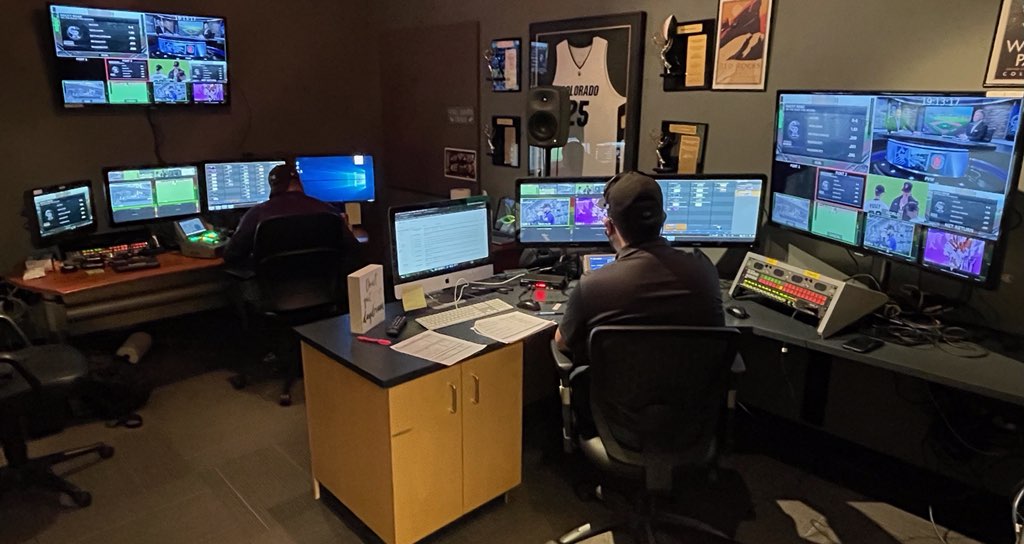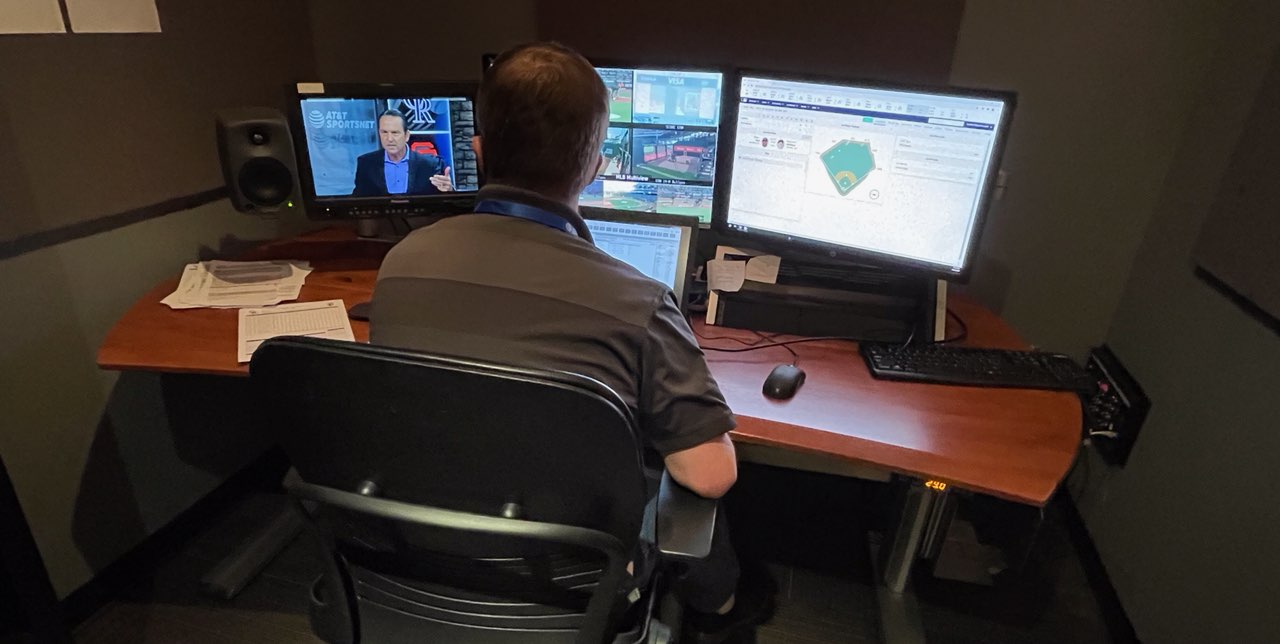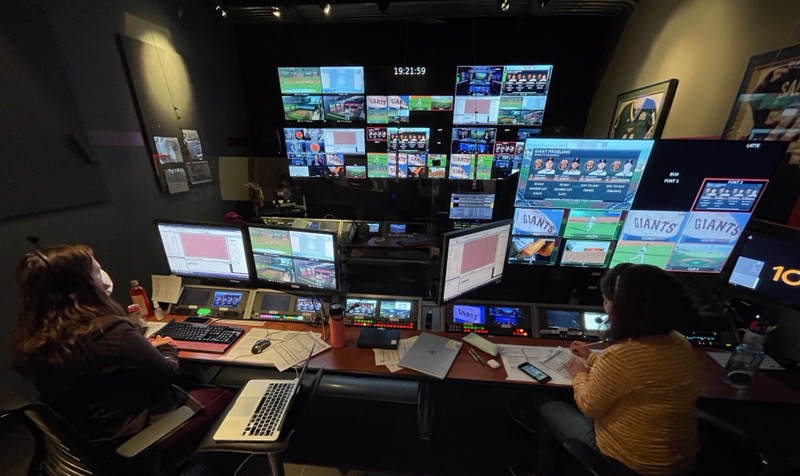AT&T SportsNet Rocky Mountain Spins Up Multi-City Model for Vegas Golden Knights Away Games
Facilities in Las Vegas, Denver, and Atlanta handle pre/postgame and intermission shows
Story Highlights
Every RSN across the country has had to adapt to a new normal as a result of the pandemic, with most forced into an enhanced world-feed model in lieu of a dedicated truck and crew onsite for away games. AT&T SportsNet Rocky Mountain, however, has come up with a whole new approach for Vegas Golden Knights productions. The Denver-based RSN is deploying four touch points to broadcast Golden Knights away games: its Downtown Denver production facility, the studio at the team’s Vegas headquarters, the away-team venue, and AT&T Sports Networks Master Control in Atlanta.
“The fans have no idea how difficult it is to get these games done because they look just as good as if [we were onsite],” says AT&T SportsNet Rocky Mountain Chief Engineer Mytch Barnes. “It’s definitely a whole new animal, but the fact that the audience at home has no idea makes us very happy. When the engineers are doing their job, no one notices us.”
Pre-COVID: Building a Multi-City Operation
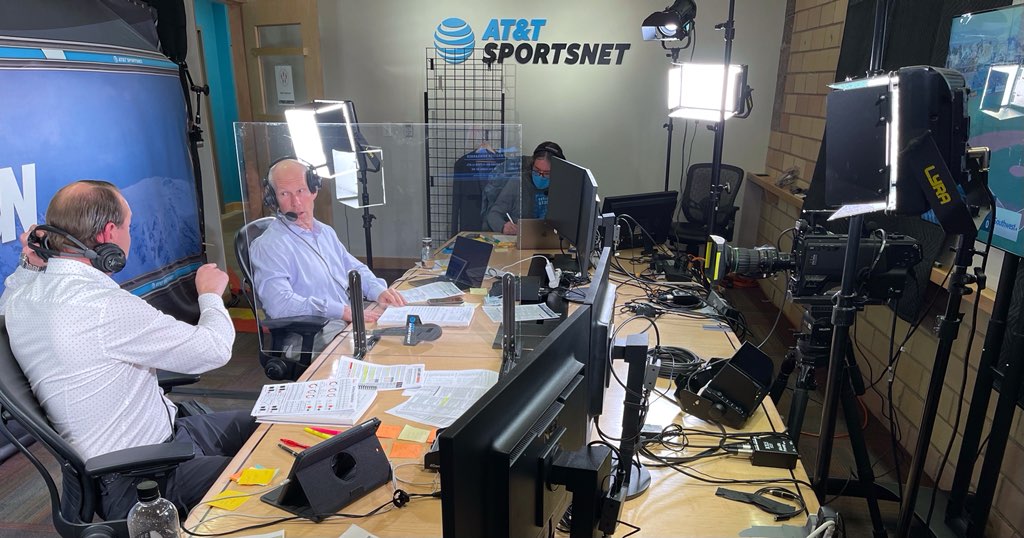
AT&T SportsNet Rocky Mountain has transformed a conference room into the announce booth for Colorado Rockies away games.
In the Golden Knights’ 2017-18 inaugural season, all productions were done in Denver at the AT&T SportsNet Rocky Mountain studio. The following year, the Golden Knights and the RSN worked with system integrator Alpha Video to build a full studio, calling it Studio 31 (as the NHL’s 31st team), at the team’s City National Arena headquarters in Vegas. Talent for pregame/intermission/postgame shows were located at the Vegas studio, but the crew — producer/director, TD, replay, graphics — were located at the RSN’s control room 762 miles away in Denver.
“Then COVID came and changed the game for everybody,” says Barnes. “Our talent was no longer allowed to travel so we had to find a place for the in-game talent. But we had only one studio at City National Arena, so that complicated things. Less than a year into launching that studio, we basically had to redesign how everything was going to function.”
COVID’s Impact on the Vegas Facility
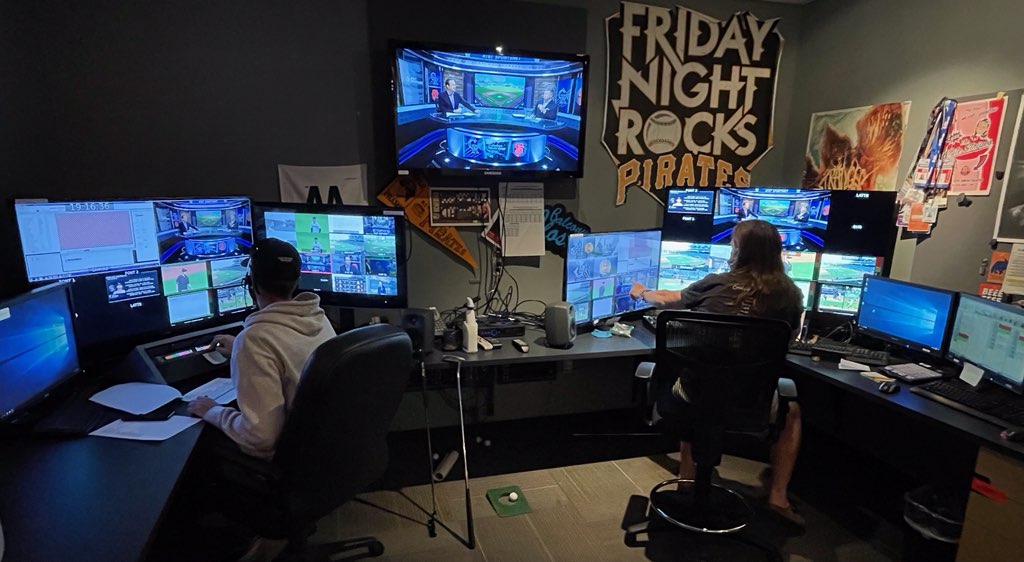
At AT&T SportsNet Rocky Mountain’s Denver facility, which produces both Vegas Golden Knights and Colorado Rockies games, a graphics suite is now the production-control room.
AT&T Sportsnet Rocky Mountain opted to put play-by-play announcer Dave Goucher and game analyst Shane Hnidy in the primary studio and move pre/postgame and intermission host Daren Millard and studio analysts Mike McKenna and Darren Eilot down the hall to the Mackenzie River Grill restaurant at City National Arena
AT&T SportsNet Rocky Mountain had 12 Haivision encode/decode channels running between Vegas and its Denver facility but was using only eight of them to populate the monitors in the Vegas studio. The four extra channels are now being used to send feeds from the Denver control room to the new makeshift studio at Mackenzie River Grill: the AD router that allows the producer in Denver to show any video feed to the talent in Vegas, a hardline for graphics, a program feed, a world clean feed from the away arena. Vegas sends three cameras to Denver: two from the pre/post/intermission show in the restaurant and one from the play-by-play and analyst in the studio.
“We had to work closely with our [IT] network team and with the [Golden Knights’ IT] network team to even make this all possible,” says Barnes. “The team’s network folks are not necessarily broadcast folks, so they had to do a lot of learning along the way with us to be able to make sure that their switches were provisioned properly to allow all this traffic since we’re pushing 300-400 Mbps per show with all the video that’s going back and forth.”
To connect the five talent and six crew members involved in the productions, the RSN uses a mix of Unity Intercom (for the restaurant studio) and RTS RVON (for the main studio) comms systems.
“Comms was an interesting hurdle to overcome,” notes Barnes. We were some early adopters of Unity, and we were already set up with Unity before any of this happened. We rely pretty heavily on Unity to get our intercoms around [City National Arena] because there is no connectivity from the studio to the restaurant.”
For game production, the RSN’s Mobile TV Group truck remains onsite, with the production crew socially distanced across the truck and three rooms near the truck dock.
COVID’s Impact on the Denver Effort
To serve the new COVID-era production model for both Golden Knights and Colorado Rockies games, AT&T SportsNet Rocky Mountain also had to drastically revamp its Downtown Denver production facility. The primary control room previously used for studio shows became the home of away-game productions (using the world feed provided by the home-team broadcaster), and Rockies pre/post-game talent remained in the studio. Meanwhile, what used to be a conference room became the away-game booth for Rockies announcers Drew Goodman, Jeff Huson, and Ryan Spilborghs.
The office space previously occupied by creative services (all non-essential personnel outside the live production are still working remotely) was transformed into a makeshift control room for the Golden Knights and Rockies studio shows. The provisional control room houses the producer, director, camera shading, and A2 for audio and houses eight large monitors, six comms station, and all necessary router panels.
“Regardless of where the Knights are, the pre/post and intermission [production crew] are here in Denver,” says Barnes. “We use our RTS RVON [comms system] to connect directly to the truck in Vegas, so we’ve got full communication as if they were in the truck. We also sent out a bunch of Decimator [crossconverters], so we can get two quad splits and one 16X split, so that they can see most of what they would see if they were in the truck and able to fully produce the show.”
Barnes credits fellow Broadcast Engineers Jon Allison and Brandon Connelly and Operations Manager Mike Schanno for successfully putting together this production model and keeping Golden Knights productions rolling.
“It has been great right from the first show,” says Barnes. “There were only small tweaks from there, and we’ve had no big problems. That’s definitely a testament to what a great team we have and all the hard work they’ve done. We went through some growing pains at the beginning of COVID, but the season has gone really well, and we’re really proud of that.”
